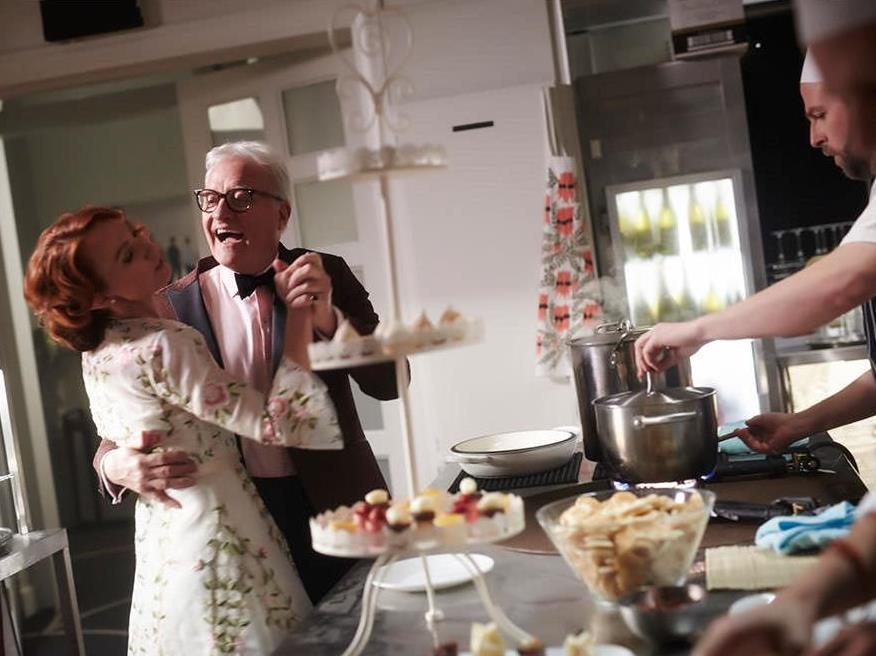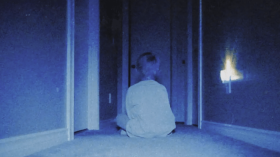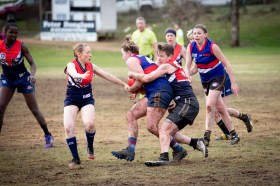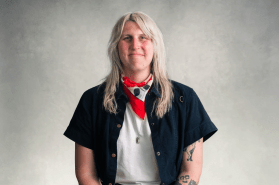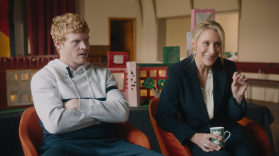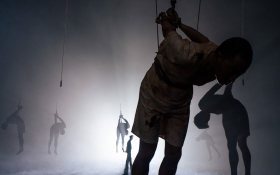Image: The Divorce, a 4 x 26 minute TV opera about divorce, was a collaboration between Princess Pictures and Opera Australia for the ABC. Not your usual production fare.
The screen sector is deep in the grip of the dreaded disruptive innovation. For a new generation, it is said to offer great opportunities, but it turns out to be a mess.
The truth is, everyone wants to be part of the main game. We all need money and secure structures, which always boil down to sustainable production companies and predictable markets. The people who relish disruptive innovation really want to own a new version of the system.
Chaos is not an end in itself. Observers who say this is not a phase, that the new normal is endless destruction and temporary structures, describe a future which is truly terrifying. We all want something stable to float above the battlefield, even if the aerial city is always being rebuilt.
What does this mean for emerging screen creatives?
Paul Walton is a producer and Head of Production at Princess Pictures, responsible for recruiting new staff and crewing projects. ‘You can pick up a camera or write a screenplay and make it a short film or a webisode series but it doesn’t necessarily mean that what you do has been crafted’, he said in an interview. ‘We all know it takes a piece of wood with four other pieces of wood to make a table. But you need craft to make a table which will last forever.
‘I also feel that we’re creating a lot of technicians who can be proficient with the technology but not necessarily creative in the application of it. And yet we also have amazingly creative people who are struggling to find a way to make that a professional career.’
He divides the experience of emerging people into amateur and professional hours. The amateur hours are the vital seedbed, in which people learn the basics, create gangs, and get a feel for where they are going. Carefully promoted they can lead to awards on the net, and lots of clicks.
But professional hours induct people into systematic ways of working, provide steady practice, teach people saleable roles, and provide credits which are a badge of ability.
‘It’s really easy to clock up amateur hours in the industry at the moment and it didn’t used to be,’ he said. ‘But its really hard and really challenging to clock up professional hours.’
The problem for a production company is that awards and clicks don’t count for much compared to a formal education. ‘If you win an online award for cinematography, you are up against people who have gone to film school, crafted out a career and clocked up professional hours and you’ve just won an award for cinematography for an essentially amateur production. No doubt you are really creative but you’ve got no professional hours. How do you translate those amateur hours into professional hours?’
One answer is to start at the bottom. That is the time-honoured solution, tricky because everyone has to use their valuable informal experience in a role that is pretty basic. Walton argues that no-one starts with a job that leads directly to their dreams. They find a hole, learn heaps, and find ways of skipping sideways.
A remarkable company
He takes that observation as an operational issue for which he wants to take responsibility. HIs solution is bound up with the fact that Princess Pictures is a remarkable company. It was started by Laura Waters in 2003 which had made all five television series to date with actor, chameleon and social satirist Chris Lilley. Harnessing his special talent into a workable world, with the right directors and heads of department, sustaining a home at the ABC, and managing the mixture of adoration that he provokes is an amazing achievement in itself.
But, as Walton reminded me, Princess Pictures is now much more than a comedy specialist. It has four partners – Waters, Walton, Andrea Denholm and Emma Fitzsimons. Said Walton, ‘Now we have a children’s department, a drama department, a non-scripted department and then our traditional comedy department. It’s all storytelling and it’s about bringing really great people together.
‘And we nurture talent and back talent in – that is the cornerstone of the business.’
Part of that is about paying close attention to those people who start at the bottom, to provide the opportunities to grow and build a track record.
‘It’s not a company with a super-strong hierarchy,’ he said. ‘Every week we all come together and talk through what we are doing. Whether they are answering the door or editing, we always trying to value everyone’s input.
‘We will often do the pitch that we gave the network to the entire staff so that they can buy into it, so that everybody in the building lives and breathes everything that we do. That means everyone is invested, and its not just one person’s vision.’
He will offer the marginal, experimental projects to the whole group. ‘People put their hand up, and it’s opposed to “You are going off and that’s your job today.” I don’t know how sustainable it is, but hey – it’s fun.’
Just do it
A remarkable number of the current projects on their slate emerged from the hothouse of YouTube and non-traditional webisodes.
‘There are so many great ideas where we used to feel we needed to be given permission to do them, and we’ve got to the point in the business where we’ve gone “Stuff it, we’re going to do it anyway!”’
They now have enough resources in the company to seed projects, using their own equipment, or making deals with external producers. They are creating a range of professional hour opportunities, and also creating the pilot episodes which buyers now demand.
Screen Australia provided funding for a comedy incubator. They received 200 proposals in a call-out, from which they selected 15. ‘We will make all of them in some shape or form, and we will back them in without asking permission.’ Then they will go to the disruptive market, with its extra channels and IPTV outlets. ‘That is where the broader range of customers help, because niche isn’t scary now, so you can find those places to go. I think.’
The Graceland Happiness Project is an excellent example of the approach. ‘It should never have been made’, said Walton. ‘We just went, “Well, it’s weird and no-one is going to want it and we can’t pitch it on paper, so we can make it anyway.”’
The 10 part webisode series, partly funded by Pozible, is about the unlikely friendship between Ben Zabel who struggles with depression, and eternal optimist Tim Dormer. They go to Graceland, to explore the realities of mental illness, and search for hope and redemption. The series is now in schools all over Australia with an educational guide, and has been run on ABC iView.
‘It is a project we are really proud of, said Walton. ‘To have the ability just to make that and back it in – I think that is what Princess is about – identifying talent and great projects and just just doing them anyway.’
‘We are also a magnet for emerging talent on the technical front as well, so we have a Production Pathways internship program where people come and hang out – and then never leave. It’s purely to build some of those professional hours for them so we will work alongside them. It’s not a black market workforce. It is purely about giving people an opportunity to do things.
In a sense, we are building a picture about a company culture, a set of ethics and approaches which is sustaining Princess on the journey from a traditional production company to something versatile and surprising. So far, it is the successful face of disruptive innovation.
Paul Walton is the designated idealist, a kind of guardian bee who allows the hive to hum along in peace. But he speaks for the core DNA of the organisation, expressed in a lively range of different projects, audiences and finance models.
‘My philosophy is that you have two accounts in your life. Your currency account feeds your heart and your financial account pays the bills. And the currency should always exceed finance if you want to be happy. If you have a load of finance and no currency, you are really unhappy. The more finance you generate the more currency you need, so the more finance Princess generates and the more stable it becomes, the more we have to give currency to people.
‘You have to keep that balance of currency and finance really close to each other, but make sure people have fun and they are invested, and they enjoy the experience and feel happy with the currency and finance level.
‘I think we pay really fairly and I can sleep really straight in bed because we are also very loyal. If people have invested themselves in emerging creatively, it very often means they are looking for a foot in the door in a professional career, and we never keep trading on people’s favours. It’s not what we do.
‘In shows with tight budgets, everybody is on the same deal and there is no negotiation. The Awards are for a reason, so we will use it as long as it is fair and everyone is on it. On some projects Princess can’t take a fee, but the rewards will flow back and we’re keeping people working. We know what it takes and we are prepared to put in as much as other people.’
